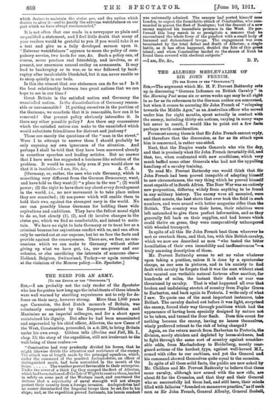THE NEED FOR AN ARMY.
[To TILE EDITOR OF THE "SPECTATOR."' Sin,—I am probably not the only reader of the Spectator who has forgotten how long ago the inhabitants of these islands were well warned by startling experiences not to rely for de- fence on their navy, however strong. More than 1,600 years ago Carausius, the first Dutch monarch of Britain, was reluctantly recognized by the Emperors Diocletian and Maximian as an imperial colleague, and for a short space maintained his dignity. But after he had been assassinated and superseded by his chief officer, Allectus, the new Cmsar of the West, Conetantius, proceeded, in A.D. 296, to bring Britain under his own sway. Gibbon tells (Decline and Fall, Bk. L, chap. 13) the story of the expedition, still not irrelevant to the well-being of these realms :— " Constantius had very prudently divided his forces, that he might likewise divide the attention and resistance of the enemy. The attack was at length made by the principal squadron, which, under the command of the praefect Asclepiodotus, an officer of distinguished merit, had been assembled in the mouth of the Seine The weather proved favourable to their enterprise. Under the cover of a thick fog they escaped the fleet of Allectus, which had been stationed off the Isle of Wight to receive them, landed in safety on some part of the Western coast, and convinced the Britons that a superiority of naval strength will not always protect their country from a foreign invasion. Asclepioclotus had no sooner disembarked the Imperial troops than he set fire to his ships; and, as the expedition proved fortunate, his heroic conduct was universally admired. The usurper had posted himself near London, to expect the formidable attack of Constantine, wbo com- manded in person the fleet of Boulogne; but the descent of a DM enemy required his immediate presence in the West. He per- formed this long march in so precipitate a manner that he encountered the whole force of the praefect with a small body of harassed and disheartened troops. The engagement was soon terminated by the total defeat and death of Allectus; a single battle, as it has often happened, decided the fate of this great island ; and when Constantius landed on the shores of Kent he found them covered with obedient subjects."










































 Previous page
Previous page